10 start with B start with B
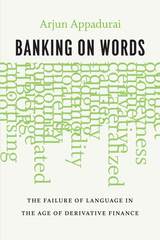
Appadurai moves in four steps through his analysis. In the first, he highlights the importance of derivatives in contemporary finance, isolating them as the core technical innovation that markets have produced. In the second, he shows that derivatives are essentially written contracts about the future prices of assets—they are, crucially, a promise. Drawing on Mauss’s The Gift and Austin’s theories on linguistic performatives, Appadurai, in his third step, shows how the derivative exploits the linguistic power of the promise through the special form that money takes in finance as the most abstract form of commodity value. Finally, he pinpoints one crucial feature of derivatives (as seen in the housing market especially): that they can make promises that other promises will be broken. He then details how this feature spread contagiously through the market, snowballing into the systemic liquidity crisis that we are all too familiar with now.
With his characteristic clarity, Appadurai explains one of the most complicated—and yet absolutely central—aspects of our modern economy. He makes the critical link we have long needed to make: between the numerical force of money and the linguistic force of what we say we will do with it.
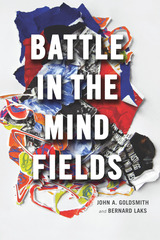
Taking note of this phenomenon, John Goldsmith and Bernard Laks embark on a uniquely interdisciplinary history of the genesis of linguistics, from nineteenth-century currents of thought in the mind sciences through to the origins of structuralism and the ruptures, both political and intellectual, in the years leading up to World War II. Seeking to explain where contemporary ideas in linguistics come from and how they have been justified, Battle in the Mind Fields investigates the porous interplay of concepts between psychology, philosophy, mathematical logic, and linguistics. Goldsmith and Laks trace theories of thought, self-consciousness, and language from the machine age obsession with mind and matter to the development of analytic philosophy, behaviorism, Gestalt psychology, positivism, and structural linguistics, emphasizing throughout the synthesis and continuity that has brought about progress in our understanding of the human mind. Arguing that it is impossible to understand the history of any of these fields in isolation, Goldsmith and Laks suggest that the ruptures between them arose chiefly from social and institutional circumstances rather than a fundamental disparity of ideas.
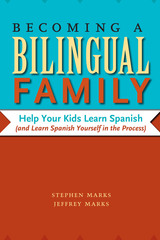
Would you like your children to grow up bilingual, even if you aren’t yet? Then speak to your kids in Spanish as you learn the language along with them. Becoming a Bilingual Family gives English-speaking parents the tools to start speaking Spanish with their kids in their earliest years, when children are most receptive to learning languages. It teaches the vocabulary and idioms for speaking to children in Spanish and offers practical, proven ways to create a language-learning environment at home.
The first part of the book introduces parents to many resources—books, audio books, music, television, computer programs, childcare workers, school, and friends—that can help you establish a home environment conducive to the acquisition of Spanish. The second part is a Spanish phrasebook that takes you through all the typical activities that parents and children share, from getting up in the morning to going to bed at night. Few, if any, other Spanish study aids provide this much vocabulary and guidance for talking to small children about common daily activities. The authors also include a quick course in Spanish pronunciation and enough grammar to get a parent started. Spanish-language resources, kids’ names in Spanish, and an easy-to-use index and glossary complete the book.
Take the Markses’ advice and start talking to your kids in Spanish, even if it’s not perfect. You’ll learn the language together and share the excitement of discovering the peoples and cultures that make up the Spanish-speaking world.
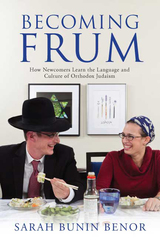
Winner, 2013 Sami Rohr Choice Award for Jewish Literature
When non-Orthodox Jews become frum (religious), they encounter much more than dietary laws and Sabbath prohibitions. They find themselves in the midst of a whole new culture, involving matchmakers, homemade gefilte fish, and Yiddish-influenced grammar. Becoming Frum explains how these newcomers learn Orthodox language and culture through their interactions with community veterans and other newcomers. Some take on as much as they can as quickly as they can, going beyond the norms of those raised in the community. Others maintain aspects of their pre-Orthodox selves, yielding unique combinations, like Matisyahu’s reggae music or Hebrew words and sing-song intonation used with American slang, as in “mamish (really) keepin’ it real.”
Sarah Bunin Benor brings insight into the phenomenon of adopting a new identity based on ethnographic and sociolinguistic research among men and women in an American Orthodox community. Her analysis is applicable to other situations of adult language socialization, such as students learning medical jargon or Canadians moving to Australia. Becoming Frum offers a scholarly and accessible look at the linguistic and cultural process of “becoming.”
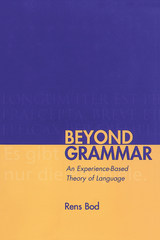


An insightful exploration of the impact of urban change on Black culture, identity, and language
Across the United States, cities are changing. Gentrification is transforming urban landscapes, often pushing local Black populations to the margins. As a result, communities with rich histories and strong identities grapple with essential questions. What does it mean to be from a place in flux? What does it mean to be a specific kind of person from that place? What does gentrification mean for the fabric of a community?
In The Black Side of the River, sociolinguist Jessi Grieser draws on ten years of interviews with dozens of residents of Anacostia, a historically Black neighborhood in Washington, DC, to explore these ideas through the lens of language use. Grieser finds that residents use certain speech features to create connections among racial, place, and class identities; reject negative characterizations of place from those outside the community; and negotiate ideas of belonging. In a neighborhood undergoing substantial class gentrification while remaining decisively Black, Grieser finds that Anacostians use language to assert a positive, hopeful place identity that is inextricably intertwined with their racial one.
Grieser’s work is a call to center Black lived experiences in urban research, confront the racial effects of urban change, and preserve the rich culture and community in historic Black neighborhoods, in Washington, DC, and beyond.


Plunging into the verbal quagmire of official language used by bureaucrats in both government and business, distinguished linguist Roger W. Shuy develops new techniques based on linguistic principles to improve their communication with the public.
Shuy presents nine case studies that reveal representative problems with bureaucratic language. He characterizes the traits of bureaucratic language candidly, though somewhat sympathetically, and he describes how linguists can provide bureaucrats with both the tools for communicating more clearly and also the authority to implement these changes.
Drawing on documents cited in class action lawsuits brought against the Social Security Administration and Medicare, Shuy offers a detailed linguistic analysis of these agencies’ problems with written and oral communication, and he outlines a training program he developed for government writers to solve them. Moving on to the private sector, Shuy analyzes examples of the ways that businesses such as car dealerships, real estate and insurance companies, and commercial manufacturers sometimes fail to communicate effectively. Although typically bureaucracies change their use of language only when a lawsuit threatens, Shuy argues that clarity in communication is a cost effective strategy for preventing or at least reducing litigation.
Bureaucratic Language in Government and Business explains why bureaucratic language can be so hard to understand and what can be done about it.
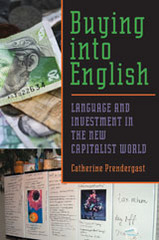
Many developing countries have little choice but to “buy into English” as a path to ideological and material betterment.
Based on extensive fieldwork in Slovakia, Prendergast assembles a rich ethnographic study that records the thoughts, aspirations, and concerns of Slovak nationals, language instructors, journalists, and textbook authors who contend with the increasing importance of English to their rapidly evolving world. She reveals how the use of English in everyday life has becomes suffused with the terms of the knowledge and information economy, where language is manipulated for power and profit.
Buying into English presents an astute analysis of the factors that have made English so prominent and yet so elusive, and a deconstruction of the myth of guaranteed viability for new states and economies through English.
READERS
Browse our collection.
PUBLISHERS
See BiblioVault's publisher services.
STUDENT SERVICES
Files for college accessibility offices.
UChicago Accessibility Resources
home | accessibility | search | about | contact us
BiblioVault ® 2001 - 2024
The University of Chicago Press









